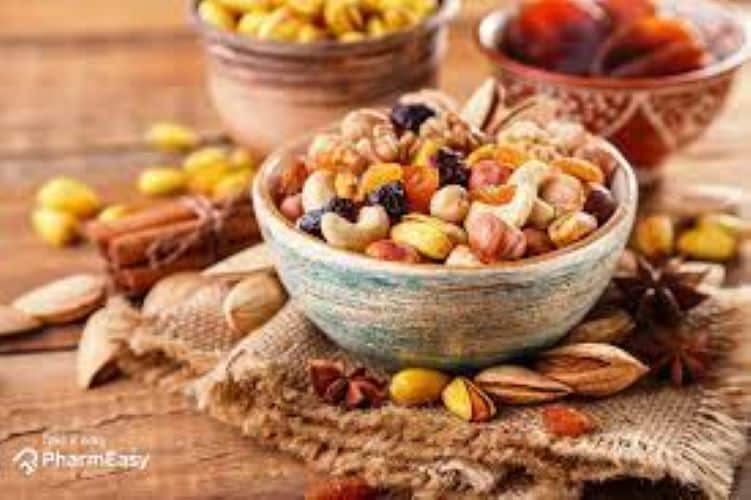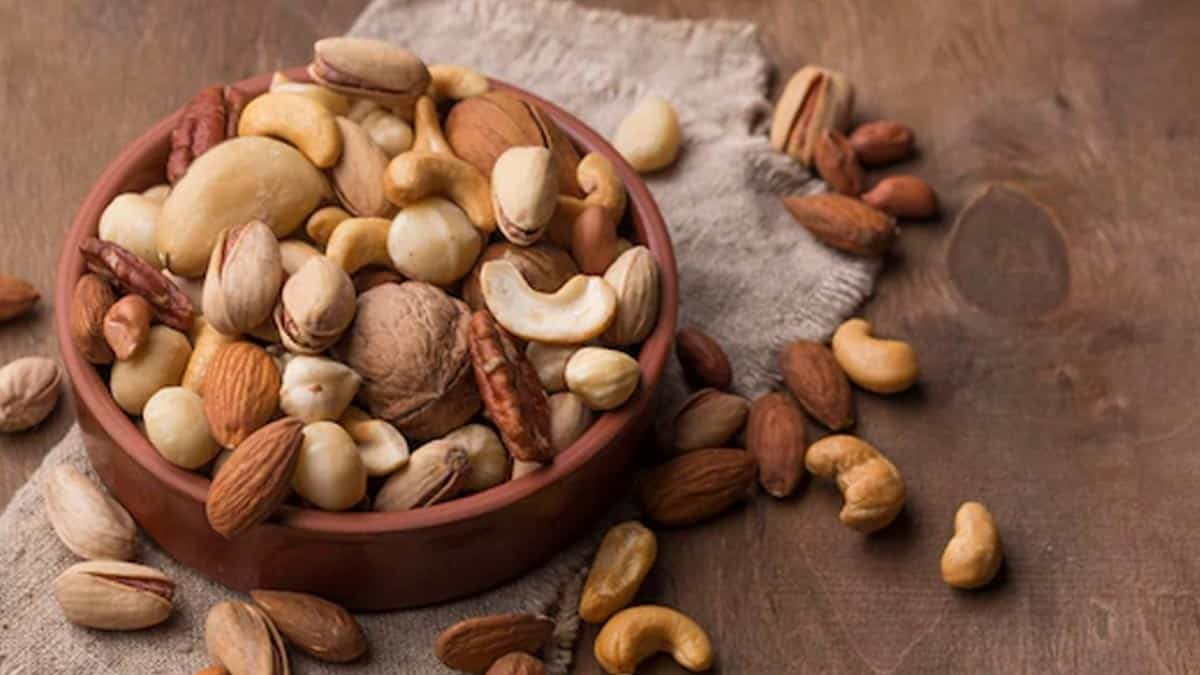Blog
7 Best Dry Fruits For Healthy Blood Pressure

Blood pressure is the force that blood puts on the walls of your arteries. It’s measured in millimeters of mercury (mm Hg), and it can be normal, high, or low. High blood pressure is called hypertensive, and it’s a major risk factor for heart disease. Hypertension occurs when there are too many demands on the heart muscle or when the heart doesn’t relax between beats properly, which then affects its ability to pump efficiently through the body. It can also occur because of other factors including genetics, hormone levels or medications such as diuretics (water pills).
Almonds and Mixed Nuts
Almonds and mixed nuts are rich in omega-3 fatty acids, which can lower blood pressure by helping to relax your arteries. They are also a great source of vitamin E, magnesium, and potassium–all nutrients that help lower blood pressure by reducing inflammation throughout the body.
Nuts are also rich in fiber, which can help lower blood pressure by reducing your body’s reliance on salt and calcium. Eating a handful of nuts each day may also help reduce your risk for heart disease and stroke by lowering levels of LDL cholesterol and triglycerides in the blood.
Nuts are also a great source of magnesium, which can help relax your blood vessels by increasing blood flow. Magnesium is also important for heart health because it helps regulate the body’s production of hormones that control blood pressure.
In addition to being a good source of protein, nuts are also loaded with fiber and healthy fats. All these nutrients can help reduce your risk for heart disease and stroke by lowering levels of LDL cholesterol and triglycerides in the blood. Nuts are also rich in magnesium, which helps relax blood vessels by increasing blood flow. Magnesium is also important for heart health because it regulates production of hormones that control blood pressure.
Raisins and Dates
Raisins and dates are rich in potassium, a mineral that helps maintain healthy blood pressure levels. Dates are also a good source of fiber, iron and other nutrients. They contain antioxidants like vitamin A and C as well as zinc–all of which may help prevent heart disease by reducing damage to arteries caused by oxidation (free radical formation). Dates are also high in magnesium, another mineral that helps keep blood pressure low by relaxing muscles within your arteries.
So what’s not to love about these sweet treats? Dates contain vitamin B6 (pyridoxine), folate and riboflavin–vitamins that have been shown to lower homocysteine levels (a marker for heart disease) when consumed regularly over time
. The combination of these vitamins, along with potassium and magnesium, means that dates may help lower your risk of heart disease by reducing blood pressure.
Dates are also a great source of fiber, which can help lower cholesterol levels when consumed regularly. One study found that people who ate a high-fiber diet had lower total and LDL (“bad”) cholesterol levels than those who did not.
Dates have also been shown to reduce markers of inflammation in the body. Inflammation is believed by scientists to play a role in many chronic diseases, including heart disease and diabetes.
Dates also contain antioxidants that can help prevent cell damage and reduce the risk of heart disease. The fiber in dates may also help lower cholesterol levels and blood pressure.
Apricots
Apricots are rich in potassium, which helps lower blood pressure. They’re also a good source of vitamin C and fiber, both of which can help to reduce inflammation and regulate blood sugar levels.
In addition to these benefits, apricots contain antioxidants that have been shown to protect the heart against damage caused by free radicals. The fruit’s high levels of beta-carotene may also help prevent cancer cells from growing in the body.
The potassium in apricots helps to keep your heart healthy. The nutrient helps regulate blood pressure, which plays a role in reducing the risk of stroke and heart attack. Potassium can also help lower levels of homocysteine, a harmful amino acid that is associated with an increased risk of cardiovascular disease (CVD).
Apricots are also a good source of fiber, vitamin C and beta-carotene. Fiber can help lower cholesterol levels, which may reduce the risk of heart disease. Vitamin C has been shown to reduce blood pressure in people with hypertension and may also have a positive effect on blood vessel function. Beta-carotene has been linked to a reduced risk of cancer and other chronic diseases.
Pistachios
Pistachios are a good source of Vitamin B, Magnesium, and Phosphorus. These nuts can help lower blood pressure by reducing cholesterol levels in the body. They are also high in antioxidants that protect against heart disease by preventing oxidation of LDL cholesterol (the bad kind).
Pistachios contain phytosterols that reduce inflammation and prevent clogged arteries from forming plaques on them. If you want to include pistachios in your diet regularly then try adding them into salads or smoothies for better results as compared to eating them on their own!
-Eating pistachios can help lower cholesterol levels, especially the bad kind. They also contain antioxidants that protect your heart and prevent clogged arteries from forming plaques on them.
-Pistachios are a good source of Vitamin B, Magnesium, and Phosphorus. These nuts can help lower blood pressure by reducing cholesterol levels in the body. They are also high in antioxidants that protect against heart disease by preventing oxidation of LDL cholesterol (the bad kind). Pistachios contain phytosterols that reduce inflammation and prevent clogged arteries from forming plaques on them. If you want to include pistachios in your diet regularly then try adding them into salads or smoothies for better results as compared to eating them on their own!
Walnuts
Walnuts are a great source of omega-3 fatty acids. Omega-3 fatty acids are known to reduce the risk of heart disease, stroke and other cardiovascular diseases.
Walnuts also have high amount of antioxidants which helps lower blood pressure naturally.
Walnuts are a great source of essential fatty acids and proteins. They also contain vitamins, minerals and antioxidants which help in lowering cholesterol levels.
The antioxidants in walnuts help reduce the risk of heart disease by preventing oxidation and inflammation within the arteries. Walnuts are rich in Omega-3 fatty acids, which helps reduce the risk of cardiovascular diseases by lowering blood pressure and triglyceride levels.
Walnuts are a great source of proteins and essential fatty acids. They also contain antioxidants which help prevent oxidation within the arteries.
Walnuts are rich in Omega-3 fatty acids, which helps reduce the risk of cardiovascular diseases by lowering blood pressure and triglyceride levels. Walnuts are a great source of proteins and essential fatty acids. They also contain antioxidants which help prevent oxidation within the arteries.
Pine Nuts
- Pine nuts are a good source of protein, fiber and healthy fats.
- Pine nuts are rich in vitamin E.
- They contain manganese, copper, magnesium and zinc.
- In addition to being a source of vitamin K which helps with blood clotting..
Pine nuts are also a good source of selenium and phosphorous. Pine nuts contain the following vitamins:
-Vitamin A -Vitamin C -Vitamin E
-Vitamin K -Minerals: phosphorous, copper, magnesium and zinc. -Protein and fat.
-Vitamin A: Vitamin A is an essential nutrient that helps maintain healthy skin, eyes and immune system. -Vitamin C: Vitamin C is a water-soluble vitamin that helps boost the immune system and supports skin health.
-Vitamin E: This fat-soluble vitamin is an antioxidant that may help protect against cell damage. -Vitamin K: Vitamin K is a fat-soluble vitamin found in green leafy vegetables and other plant foods. It plays a role in blood clotting and helps the body absorb calcium.
Figs and Gooseberries
Figs and gooseberries are good for blood pressure. They are rich in potassium, magnesium, calcium and vitamin C.
You can eat them raw or cook them with rice or any pulses like dal etc.
Gooseberries are a good source of vitamin C and contain high levels of antioxidants. They are also rich in potassium, magnesium, calcium and iron. You can juice them with carrot to make a healthy drink or add them to your smoothies.
They can also be cooked with rice or any pulses like dal etc. Gooseberries are a good source of vitamin C and contain high levels of antioxidants. They are also rich in potassium, magnesium, calcium and iron.
You can juice them with carrot to make a healthy drink or add them to your smoothies. They can also be cooked with rice or any pulses like dal etc. Gooseberries are a good source of vitamin C and contain high levels of antioxidants.
They are also rich in potassium, magnesium, calcium and iron. You can juice them with carrot to make a healthy drink or add them to your smoothies. They can also be cooked with rice or any pulses like dal etc. Gooseberries are a good source of vitamin C and contain high levels of antioxidants. They are also rich in potassium, magnesium, calcium and iron. You can juice them with carrot to make a healthy drink or add them to your smoothies.
They can also be cooked with rice or any pulses like dal etc. Gooseberries are a good source of vitamin C and contain high levels of antioxidants. They are also rich in potassium, magnesium, calcium and iron. You can juice them with carrot to make a healthy drink or add them to your smoothies. They can also be cooked with rice or any pulses like dal etc




One thought on “7 Best Dry Fruits For Healthy Blood Pressure”